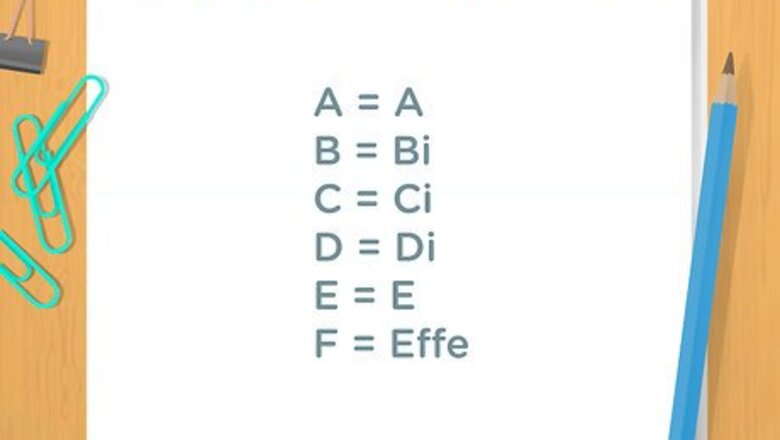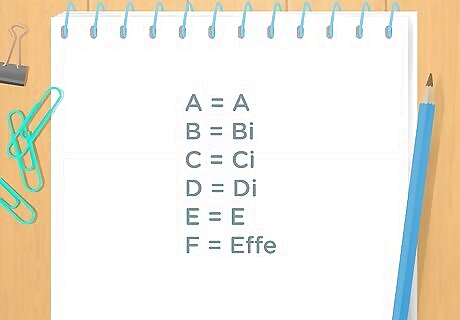
views
Mastering the Basics

Learn the Italian alphabet. Most of the letters of the Italian alphabet are shared with the English alphabet, but the pronunciation is different. The letters j (i lunga), k (cappa), w (vi/vu doppia) x (ics) and y (i greca) are not part of the Italian alphabet, but they appear in foreign words. Practice pronouncing the alphabet in Italian before you move on to pronouncing entire words. A = A B = Bi C = Ci D = Di E = E F = Effe G = Gi H = Acca I = I L = Elle M - Emme N = Enne O = O P = Pi Q = Cu R = Erre S = Esse T = Ti U = U V = Vi/Vu Z = Zeta

Practice basic phrases. Learning a few basic phrases will help you get around in Italy and decide whether going further with the language interests you. Having a little familiarity with these phrases will also give you a head start if you decide to take an Italian class. Practice pronouncing these phrases with an Italian accent: Buongiorno (“Hello / Good morning/afternoon”) Ciao (“Hi / Hello / Bye”) Arrivederci (“Goodbye”) Per favore / Per piacere (“Please”) Come sta? / Come stai? (“How are you?” [formal / informal]) Sto bene. (“I am fine / well.”) Scusi / Scusa (“Excuse me” [formal / informal]) Grazie (“Thank you”)

Get familiar with Italian grammar and vocabulary. Buy an English – Italian dictionary and a grammar book to help you start understanding the way the language is constructed. Memorize some basic vocabulary words and practice pronouncing them out loud, and do the grammar exercises until you're comfortable constructing basic sentences. Expand your Italian vocabulary by labeling items in your home with Italian words and pronouncing them out loud when you pass by. Check online for additional resources to help you practice grammar and vocabulary. You can find language forums dedicated to explaining grammar, online workshops, language learning Instagram accounts, YouTube videos, and so on.
Getting Professional Instruction

Take Italian courses. Sign up for classes at a local university or community college. You may also want to look into taking courses at a school specifically geared toward languages; these often offer intensive programs that are designed to help you learn a foreign language quickly. Check online for course opportunities as well, since they're often less expensive than in-person options. Do your Italian homework. There's no sense in taking a language class unless you're going to do all the homework and exercises. They may seem tedious, but they're absolutely necessary, since learning a brand-new language takes hours and hours of practice. Participate in class discussions. Raise your hand a lot to answer the instructor's questions. Speaking out loud as often as possible and getting feedback on your pronunciation will help you improve much faster than if you listen quietly in the back of the classroom.

Buy Italian language software. Companies like Rosetta Stone offer software to help you learn languages quickly and on your own time. These language packages have an audio component, so you can hear Italian pronunciation and practice it yourself, too. Language software can be expensive, so look into buying a used CD collection or going in on it with a friend who wants to learn Italian, too.

Get an Italian tutor. Having one-on-one instruction is invaluable when it comes to learning a new language. Hire a tutor to help you excel in the classes you are taking. Even if you aren't taking classes, consider meeting with a language tutor a few times a week so that he or she may provide the instruction you need to effectively learn Italian. Check your university's message boards for graduate students or others proficient in Italian who may advertise tutoring services. Your university's language department may also have a list of tutors available for students. If you aren't affiliated with a university, look online for people advertising tutoring services. You can work with someone who is actually in Italy by using Skype or another online video program.
Immersing Yourself in the Language

Spend time with people who speak Italian. Speak with students in more advanced Italian classes, or make friends with people who are fluent speakers. Conversing with people who are fluent in Italian is the best way to improve your language skills; it's impossible to get this kind of practice by reading a textbook or using other educational resources. Start an Italian discussion group that meets a few times a week. The goal should be to speak only Italian for a full hour or so. You can have everyone discuss a certain conversation topic, or simply go with how the conversation flows. Plan outings with Italian speakers, so you can practice using the language in a variety of contexts. For example, you could go to a museum and discuss art in Italian. Find a way to speak Italian for at least half an hour a day. Even on the days when you don't meet with your group, give a fellow Italian speaker a call and chat in Italian for half an hour. Meet with an Italian instructor during his or her office hours and discuss the class in Italian. Get as much practice in as you can.

Consume Italian media. Media immersion is a good way to continue improving your skills, and it helps you gain a deeper understanding of the Italian language through pop culture and other contexts. Rent Italian films and watch them with Italian subtitles, or no subtitles at all. Focus on understanding the language; soon you should be able to pick up on what the actors are saying.

Study Italian in Italy. If you want to become fluent in Italian, there is no substitute for going to Italy and studying the language there for as long as you can. Attaining full fluency could take many years, but even a stay of 6 months to a year will vastly improve your language skills. Look for study abroad opportunities offered by your college or university. You may be able to spend a semester or a year studying in Italy. If you aren't affiliated with a school, look for work opportunities in Italy. Foreigners can work abroad through arts programs, organic farming programs, and other interesting opportunities. When you're in Italy, speak only Italian and try to avoid English. Don't gravitate toward the English-speaking foreigners you'll inevitably encounter. Many well-meaning Italians may assume you'd rather speak English, but you should politely continue to speak Italian, even if it's difficult at first. With enough time and practice, the language will begin to click and you'll be able to speak with fluency.


















Comments
0 comment